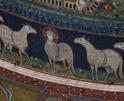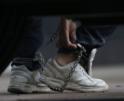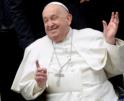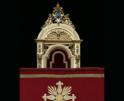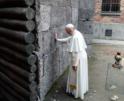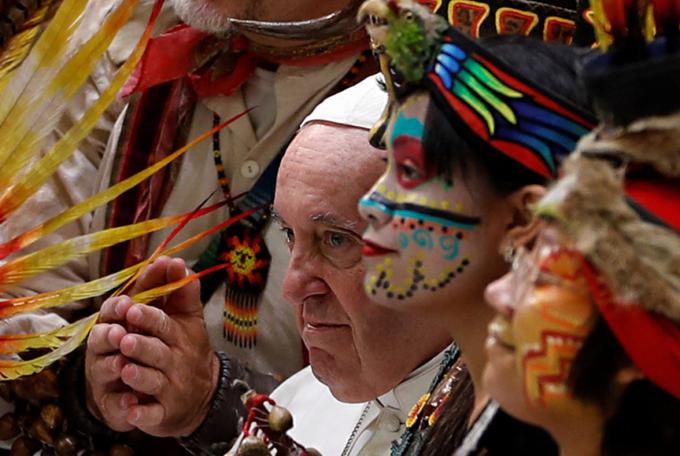
Culture
So, we quickly gleaned that the 266th pope would be a Pope of the Patroness of All Humanity.
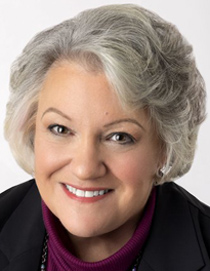
Scalia
Before he was known for anything else, Pope Francis was known as "the first non-European pope in nearly 1,300 years."
Over the last 10 years, he has led the church with energy and optimism, traveling four times a year, on average. Usually he starts and ends those trips by praying before the fifth-century Byzantine icon Salus Populi Romani ("Our Lady, health of the Roman people"), because, "With the Virgin, I go with certainty." Rarely seen with a rosary, Francis' devotion to the Blessed Virgin is nevertheless deep and transparent for Mary, he has written, is "always listening to us!"
So, we quickly gleaned that the 266th pope would be a Pope of the Patroness of All Humanity. As we've grown to know him, we have also learned to call Pope Francis:
-- The Pope of Pragmatic Humility:
When a stunned looking Cardinal Jorge Mario Bergoglio was announced in St. Peter's Square, his self-effacing remark (that the conclave seemed to have "gone to the end of the world" to find a new Bishop of Rome), led immediately a request for prayers -- first for his predecessor, Pope Benedict XVI, and then for, well, everybody: "Let us pray for each other (and) for the entire world because there is great brotherhood in the world." Eschewing the papal apartments to reside in a guesthouse for visiting clergy, Pope Francis (in his first act of papal continuum) packed his own bags, carrying them to his new digs.
-- The Pope of the Poor:
In his 2016 apostolic letter, "Misericordia et Misera," Pope Francis established the first World Day of the Poor, later kicking it off in the Paul VI Hall, sharing a beautifully catered luncheon with the destitute of Rome. The meal became a tradition that -- pausing for two years due to the global pandemic -- was joyfully reestablished in 2022. Even earlier, however, the pontiff had arranged for showers to be provided for the homeless near the Bernini colonnades embracing St. Peter's Square. Reminding critics that Jesus said the poor would always be among us, (Jn 12:8) the pope wrote, "There is no alibi to justify not engaging with the poor when Jesus has identified himself with each of them."
-- The Pope of Pastoral Tenderness:
Tenderness comes up frequently in Pope Francis' remarks, and they are of a piece with his concerns for the poor. Tenderness suggests intimacy, which is what Francis models when taking a meal with the downtrodden and engaging with them. He has developed an informal "Theology of Tenderness" demonstrating how small things most take for granted -- a shower, clean clothes, and sometimes simply being seen and greeted instead of ignored -- affirm human dignity. "Tenderness is something greater than the logic of the world," Francis told a 2022 audience. "It is an unexpected way of doing justice."
-- The Pope of Protecting the Environment:
Tenderness even slips into his thoughts on ecology. Upon receiving the fisherman's ring, Pope Francis preached, "... let us be protectors of creation, (of) God's plan inscribed in nature, protectors of one another, and of the environment," adding, "Protecting demands goodness, it calls for a certain tenderness." In his groundbreaking encyclical, "Laudato Si'," he extolled St. Joseph who, "shows great tenderness, which is not a mark of the weak but of those who are genuinely strong. ... That is why he was proclaimed custodian of the universal church," who can, "inspire us to work with generosity and tenderness in protecting this world..." (242)
-- The Pope of Pandemic Prayer and Consolation:
In a fearsome and grave global moment, as the whole world went into lockdown -- isolated and prevented from being with loved ones dying all alone -- Pope Francis brought us into supplication before God, making "An Extraordinary Prayer in the Time of Pandemic" on the evening of March 27, 2020. Starkly alone in St. Peter's Square, accompanied only by a 15th- century crucifix, the pope gave voice to what all humanity was feeling: "Thick darkness has gathered ... taken over our lives, filling everything with a deafening silence and a distressing void ... we find ourselves afraid and lost." With a monstrance, he blessed the world with the Holy Eucharist, and then -- repairing to the interior of St. Peter's Basilica -- invited us, via satellite, into an hour's contemplation before the merciful Christ, there present.
-- The Pope of Plain (and Plane) Talk:
During 40 trips abroad, Francis -- who has expressed a dislike of excessive formalities -- has often gone "off script" amid in-flight press conferences. His remarks, especially when taken out of context, became sensations. While returning from the 2013 World Youth Day gathering, the pope was asked about homosexual men in the clergy. He answered, "If someone is gay and he searches for the Lord, and has goodwill, who am I to judge?" Unsurprisingly, parties for and against cherry-picked the comment and controversy ensued. In "The Name of God is Mercy" -- his book-length interview with Andrea Tornielli published in 2016 -- Francis addressed the brouhaha head-on, saying he had paraphrased "the Catechism of the Catholic Church, where it says that these people should be treated with delicacy and not be marginalized." He reminded us that accompaniment has precedent in the Gospels, and thus we should, "... Show goodwill, show them the way and accompany them along it."
-- The Pope Proponent of the Marginalized:
The pope's concern for people on the margins is sincere and deep. Early in his pontificate -- while he was still surprisingly nimble for an older man missing a portion of a lung -- he habitually waded into the crowds to greet people, kiss babies and give his security detail agita. On one memorable occasion, encountering a man whose face was covered in tumors thanks to a genetic disorder, Pope Francis, like his saintly namesake, gently kissed and embraced him -- a man who a beauty-obsessed world found hard to look at and easy to relegate to the sidelines. "We will not find the Lord unless we truly accept the marginalized," Francis preached at a 2015 Mass for new cardinals. "Truly, dear brothers, the Gospel of the marginalized is where our credibility is at stake, is discovered and is revealed."
We might alliteratively understand Pope Francis in other ways, and his encyclicals would support us:
-- The Pope of the People: "Fratelli Tutti" ("On Fraternity and Social Friendship")
-- The Pope of Prayerful Joy: "Evangelii Gaudium" ("The Joy of the Gospel")
-- The Pope of Perpetual Hope: "Lumen Fidei" ("The Light of Faith")
He is slowing now. At the funeral of Pope Benedict XVI, it was obvious that the pope was suffering as he stood in farewell, before the casket was borne into St. Peter's for interment. Sometimes using a wheelchair, he recently made a plea for those enduring chronic pain.
As this formerly vigorous Bishop of Rome winds down, we remember these moments of greatness and know the pope by his fruits, all while acknowledging what work is yet undone -- that scandal and crises within the church remain insufficiently addressed -- that people are still in pain. We can do that prayerfully and compassionately, remembering the intentions of a pope who -- now perhaps in his twilight -- is daily wrestling with substantial and challenging issues within the culture, the church and his beloved Society of Jesus.
Doing so would demonstrate that we've learned something about tenderness, and spiritual generosity, over these past 10 years.
- Elizabeth Scalia is culture editor for OSV News.
Recent articles in the Culture & Events section
-
Scripture Reflection for May 11, 2025, Fourth Sunday of EasterDeacon Greg Kandra
-
Our heart of darknessGreg Erlandson
-
Pope Francis and the persistent habit of 'maybe'Russell Shaw
-
Laying odds on papabili, and our vulgar churchElizabeth Scalia
-
Mourning Pope Francis: A Jewish meditation on his legacyMenachem Z. Rosensaft

